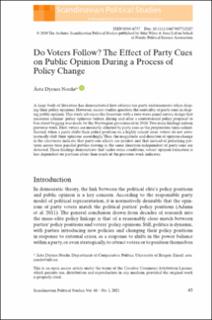Do voters follow? The effect of party cues on public opinion during a process of policy change
Journal article, Peer reviewed
Published version

Åpne
Permanent lenke
https://hdl.handle.net/11250/2763444Utgivelsesdato
2021Metadata
Vis full innførselSamlinger
Sammendrag
A large body of literature has demonstrated how citizens use party endorsements when shaping their policy opinions. However, recent studies question the centrality of party cues in shaping public opinion. This study advances the literature with a four-wave panel survey design that measures citizens’ policy opinions before, during and after a controversial policy proposal to ban street begging was made by the Norwegian government in 2014. Two main findings inform previous work. First, voters are modestly affected by party cues as the proposition turns salient. Second, when a party shifts their policy position on a highly salient issue, voters do not automatically shift their opinions accordingly. Thus, the magnitude and direction of opinion change in the electorate indicate that party cue effects are modest and that instead of polarizing patterns across time parallel publics moving in the same direction independent of party cues are detected. These findings demonstrate that under some conditions, voters’ opinion formation is less dependent on partisan elites than much of the previous work indicates.
